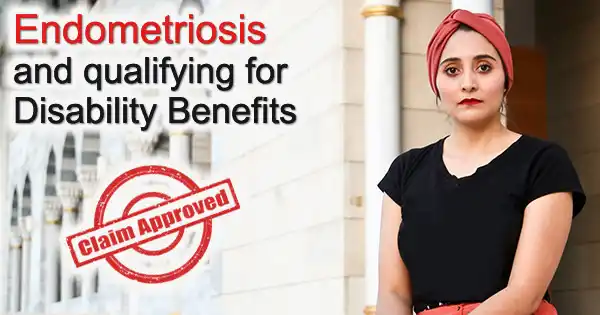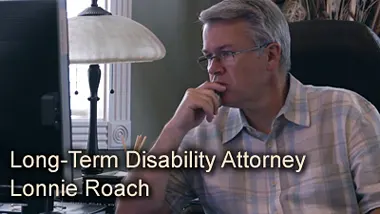Endometriosis and Qualifying for SS Disability Benefits
Can I get disability benefits if I am suffering from the effects of Endometriosis?
Author: Attorney Lonnie Roach
Updated: 2/10/2023
Summary: Can I get disability benefits if I am suffering from the effects of Endometriosis?
First you must meet the SSA’s financial requirement: You must have worked long enough, recently enough, and not made over a predetermined level of income.
Second you must meet the medical requirements:
Qualifying for disability benefits due to endometriosis hinges on the severity of symptoms and their impact on an individual’s ability to perform essential job functions. A comprehensive medical history is required for submission to Social Security, which should include contact information for healthcare providers, a detailed list of medications and their side effects, imaging test results, surgical reports, and a narrative on how endometriosis affects daily activities such as cooking, shopping, and self-care.
Additionally, applicants must provide a thorough work history for the past 15 years, highlighting any absences or job losses attributable to endometriosis.
Endometriosis affects one in 10 women in the United States. Endometriosis is a painful disorder in which the endometrium, the tissue that lines the inside of the uterus, grows outside the uterus. The endometrium behaves like normal uterine tissue during a woman’s menstrual cycle; it breaks apart and bleeds at the end of the cycle. But, in endometriosis, the blood has no way to exit the body and becomes trapped. Cysts, scar tissue and adhesions can develop, causing severe pain, especially during periods and leading to infertility. If you are suffering from the effects of Endometriosis you may qualify for disability benefits.

Social Security does not have an official listing for endometriosis, however, you may be eligible if Social Security finds that your “functional capacity” (tasks you can do) is so limited that there are really no jobs you can be expected to do. Call 512-454-4000 for help today.
The main symptom of endometriosis is pelvic pain, usually associated with menstrual periods.
Some women experience cramping during periods, but women with endometriosis describe pain that much worse than normal. Pain can become worse with time, but the severity of pain is not necessarily a reliable measure of the extent of the condition. A woman could have severe pain with mild endometriosis or little or no pain with advanced endometriosis.
The main complications of endometriosis are infertility and cancer.
Endometriosis is the leading cause of infertility, affecting five million women in the United States. Though ovarian cancer occurs at higher rates in women with endometriosis, the overall lifetime risk of ovarian cancer is low. Another type of cancer, endometriosis-associated adenocarcinoma, can develop later in life in women who have had endometriosis, but cases are very rare.
Qualifying for Disability for Endometriosis
Because most cases of endometriosis are successfully managed with medications or surgery, and pain and other symptoms are intermittent, it is very difficult to qualify for Social Security Disability Income.
Social Security does not have an official listing for endometriosis in its Blue Book. However, you may be eligible if Social Security finds that your “functional capacity” (tasks you can do) is so limited that there are really no jobs you can be expected to do.
First, you must meet Social Security’s basic requirements:
- You must have worked long enough and recently enough in a job that paid Social Security taxes.
- You must not earn more than $1,550 per month in 2024. This is called Substantial Gainful Activity or SGA.
- Your medical condition must last, or be expected to last 12 months.
Whether or not you qualify will depend on how severe your symptoms are and how they have impacted your ability to perform basic tasks required for most jobs. You will need to provide a complete medical history of your condition to Social Security, including:
- Contact information for your gynecologist and other medical providers who can provide detailed documentation of your condition.
- A complete list of medications, past and present, that you’ve taken and any side effects you experienced.
- Results of imaging tests.
- Reports of surgeries you’ve undergone.
- A description of how symptoms and treatments for endometriosis have impacted your ability to perform daily tasks, like cooking, shopping, and caring for yourself.

You should also provide a complete work history from the past 15 years, noting any absences or gaps in attendance because of endometriosis.
This is important! While many women are unaware they even have the condition, those who experience severe symptoms may miss several days of work each month and even lose their jobs. If you had to leave work or missed days of work because of endometriosis, you may not be able to maintain full time employment.
Social Security will perform a Residual Functional Capacity assessment (RFC) to evaluate how your limitations affect your ability to work, considering how long you can sit, stand, walk, crouch, stoop, lift and carry objects.
Social Security will also conduct another RFC to assess your mental and psychological capabilities and limitations, including understanding and remembering, concentration, social interactions with others and ability to deal with normal work pressures. If Social Security determines you cannot do your previous job, or any other job, you may qualify for disability benefits.
Additionally, if you have another condition; for example, high blood pressure or depression, you may be eligible for SSDI.
Applicants often have more than one illness or injury that prevents them from working full time. One disorder by itself may not meet Social Security’s requirements, but if you have multiple medical conditions, Social Security must consider how those health issues, combined together, limit your ability to hold a job and perform necessary daily tasks.
Again, it is very difficult to qualify for Social Security Disability Income with endometriosis and only the most severe cases have a chance of approval.
If you have endometriosis and are unable to work because of your medical condition, you should consider consulting an experienced Social Security Disability attorney who can review your case and help you decide the best way to proceed.
In order to qualify for Social Security Disability, you will need to satisfy a few specific requirements in two categories as determined by the Social Security Administration.
The first category is the Work Requirements which has two tests.
- The Duration of Work test. Whether you have worked long enough to be covered under SSDI.
- The Current Work Test. Whether you worked recently enough for the work to actually count toward coverage.
The second category is the Medical Eligibility Requirement.
- Are you working? Your disability must be “total”.
- Is your medical condition severe? Your disability must be “severe” enough to interfere with your ability to perform basic work-related activities, such as walking, sitting, and remembering.
- Is your medical condition on the List of Impairments? The SSA has a “List of Impairments” that automatically qualify as “severe” disabilities. If your disease is not listed this does not mean you cannot get disability, it means you must prove you cannot maintain employment due to your limitations.
- Can you do the work you did before? SSDI rules look at whether your medical condition prevents you from doing the work you did prior to developing the condition.
- Can you do any other type of work? If you cannot do your prior work, an evaluation is made as to whether you can perform any other kind of work.
More details can be found on our Qualifying for Disability page.
Disability benefits are an important source of income for those who are unable to work. If you are not able to work due to accident or illness, you may be eligible for Social Security Disability or Long Term Disability benefits. If you have applied for benefits and been denied, contact the attorneys at Bemis, Roach and Reed for a free consultation. Call 512-454-4000 and get help NOW.
Try these links for further reading on this subject:
When Should I apply for Social Security Disability?
It helps to have a supportive doctor when you file for disability
What Information will I need to apply for SSDI?


![]()
Your Free Initial Consultation
Call now:
At Bemis, Roach and Reed, if we can't help you, we will try to find the right attorneys for you.
We offer each of our prospective clients a free no obligation one hour phone or office consultation to see if we can help you and if you are comfortable with us. We know how difficult a time like this can be and how hard the decisions are. If we can be of assistance to you and help you find a solution to your issue we will even if that means referring you to another attorney.
Let's get you Started:
If you could provide us with some basic information about your claim we will get right back with you with a free case evaluation and schedule your Free Consultation Today.





